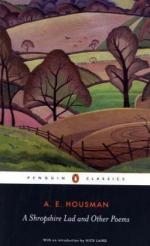|
This section contains 6,243 words (approx. 21 pages at 300 words per page) |

|
SOURCE: Kurke, Alexander David. “Immortality for a Textual Critic.” Classical and Modern Literature 18, no. 3 (spring 1998): 189-202.
In the following essay, Kurke offers an interpretation of poem LXIII of A Shropshire Lad, discussing the work in relation to Housman's career as a classics scholar.
In recognition of Arthur Platt, his former colleague at University College, London, A. E. Housman observed:
A scholar who means to build himself a monument must spend much of his life in acquiring knowledge which for its own sake is not worth having and in reading books which do not in themselves deserve to be read.1
After Housman's own death, the imagery of monument-building was taken up by A. S. F. Gow, one of Housman's most astute biographers, and applied to Housman himself.2 For Gow, Housman's monument was his pre-eminent reputation as a classicist; the “last important stone” in the monument was Housman's publication of...
|
This section contains 6,243 words (approx. 21 pages at 300 words per page) |

|


